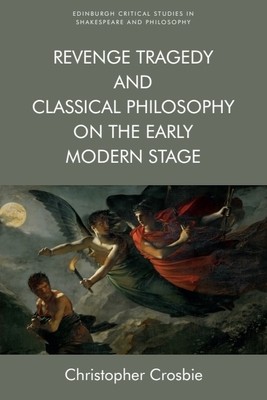
- We will send in 10–14 business days.
- Author: Christopher Crosbie
- Publisher: Edinburgh University Press
- Year: 2020
- Pages: 320
- ISBN-10: 1474440274
- ISBN-13: 9781474440271
- Format: 15.5 x 24.9 x 1.8 cm, softcover
- Language: English
- SAVE -10% with code: EXTRA
Revenge Tragedy and Classical Philosophy on the Early Modern Stage (e-book) (used book) | bookbook.eu
Reviews
Description
Examines the influence of classical philosophy on revenge narratives by Shakespeare and his contemporaries
This book discovers within early modern revenge tragedy the surprising shaping presence of a wide array of classical philosophies not commonly affiliated with the genre. By recovering the pervasive influence of Aristotelian faculty psychology on The Spanish Tragedy, Aristotelian ethics on Titus Andronicus, Lucretian atomism on Hamlet, Galenic pneumatics on Antonio's Revenge and Epictetian Stoicism on The Duchess of Malfi, Crosbie reveals how the very atmospheres and ontological assumptions of revenge tragedy exert their own kind of conditioning dramaturgical force. The book also revitalises our understanding of how the Renaissance stage, even at its most lurid, functions as a unique space for the era's practical, vernacular engagement with received philosophy.
Key Features
- Analyzes the twentieth-century development of revenge tragedy as a genre, and diagnoses the roots of modern criticism's tendency to treat most philosophy as estranged from the violent work of revenge
- Provides fresh readings of five plays central to the revenge tragedy genre, paying close attention to the conditioning influence of classical philosophy on their narratives of retribution
- Reveals how revenge tragedy's distinctive 'moods' or 'atmospheres' emerge from fully-realized sets of ontological assumptions which help shape reception of retribution on the early modern stage
- Develops new reception histories for five classical philosophical doctrines, revealing their currency and, what's more, radical adaptability within early modern England
EXTRA 10 % discount with code: EXTRA
The promotion ends in 6d.19:36:59
The discount code is valid when purchasing from 10 €. Discounts do not stack.
- Author: Christopher Crosbie
- Publisher: Edinburgh University Press
- Year: 2020
- Pages: 320
- ISBN-10: 1474440274
- ISBN-13: 9781474440271
- Format: 15.5 x 24.9 x 1.8 cm, softcover
- Language: English English
Examines the influence of classical philosophy on revenge narratives by Shakespeare and his contemporaries
This book discovers within early modern revenge tragedy the surprising shaping presence of a wide array of classical philosophies not commonly affiliated with the genre. By recovering the pervasive influence of Aristotelian faculty psychology on The Spanish Tragedy, Aristotelian ethics on Titus Andronicus, Lucretian atomism on Hamlet, Galenic pneumatics on Antonio's Revenge and Epictetian Stoicism on The Duchess of Malfi, Crosbie reveals how the very atmospheres and ontological assumptions of revenge tragedy exert their own kind of conditioning dramaturgical force. The book also revitalises our understanding of how the Renaissance stage, even at its most lurid, functions as a unique space for the era's practical, vernacular engagement with received philosophy.
Key Features
- Analyzes the twentieth-century development of revenge tragedy as a genre, and diagnoses the roots of modern criticism's tendency to treat most philosophy as estranged from the violent work of revenge
- Provides fresh readings of five plays central to the revenge tragedy genre, paying close attention to the conditioning influence of classical philosophy on their narratives of retribution
- Reveals how revenge tragedy's distinctive 'moods' or 'atmospheres' emerge from fully-realized sets of ontological assumptions which help shape reception of retribution on the early modern stage
- Develops new reception histories for five classical philosophical doctrines, revealing their currency and, what's more, radical adaptability within early modern England


Reviews